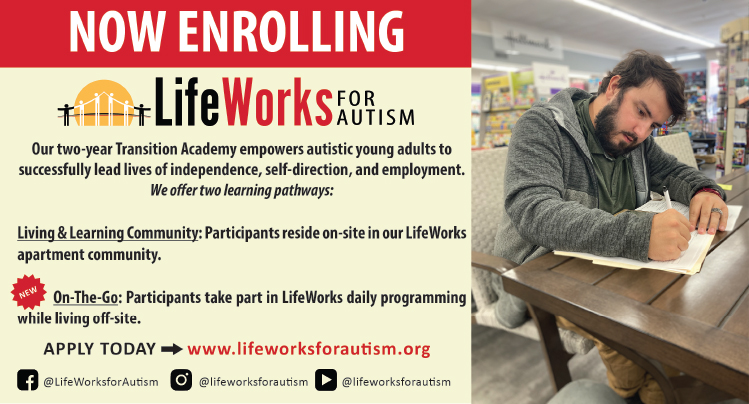
Effective communication is essential for workplace success. For autistic young adults seeking employment, understanding and adapting unique communication styles can help create more successful outcomes.
Being on the autism spectrum doesn’t mean you can’t have a meaningful and productive employment experience. In my role at LifeWorks for Autism, I help prepare and place autistic young adults in various businesses and industries. I’ve seen employers realize these individuals are a welcome addition to their workplace. Autistic young adults form a dedicated workforce known for their dependability, punctuality, and earnestness. They can excel at all types of roles.
While part of my focus is working with employers to develop their autism-readiness skills and aiding in the transition of incorporating a diverse workforce, I also work individually with participants in a vocational program to prepare for successful and meaningful employment. Here are some practical tips LifeWorks for Autism suggests to ensure successful workplace communication as an autistic young adult prepares for employment and after they’ve landed the job.
Job Shadowing
An effective strategy for becoming employment-ready is to participate in a job shadowing program, where you can experience a role and understand communication expectations.
Mock Interviews
Participating in a mock interview is a valuable tool in preparing for job interviews and workplace interactions. Mock interviews hone your skills and help you learn to be comfortable sharing about yourself and the types of work you like to do.
Inform Your Employer
Individuals on the autism spectrum tend to be very literal in their communication. It’s important to let your workplace know this so they can also communicate with very specific instructions to avoid misunderstandings.
Additionally, let your employer know that information from you may sometimes come out differently than someone who is neurotypical. Encourage the employer not to make assumptions about their meaning and to check with you if they are unsure about what you meant.
Addressing Sensory Issues
Sensory issues are common among autistic individuals. If you require accommodation, don’t hesitate to ask for support. The Americans with Disabilities Act ensures that workers who require an accommodation have equal access in the workplace.
Clarify Preferences
Talk with your workplace about their communication preferences and agree ahead of time on how to proceed. For example, discuss the best way to receive instructions (in writing or over the phone) and when the best time to communicate with you is (when you first get to work or after your break). Ask them to be very specific with their request.
Workplace Etiquette
Some workplace environments encourage small talk before meetings, asking about weekends, etc. Others don’t. Ask your employer to share workplace-specific etiquette with you. This information will provide clarity about expectations.
Practicing Nonverbal Cues
Nonverbal communication, such as eye contact, body language, and facial expressions, can enhance your interactions with colleagues. But it takes practice. Try role-playing with friends or family so you can get more comfortable with these types of interactions.
Seek Consistent Feedback
Regular check-ins and feedback sessions with your employer to clarify expectations and expected progress will provide valuable insights into your communication skills and areas for growth. Be open to the feedback and suggestions. Accepting feedback also takes practice.
Use Written Communication
Written communication can help clarify messages and reduce misunderstandings. Ask your employer to provide written instructions when possible so you can refer back to the information as needed.
Understand Social Norms
Learning to make small talk, understanding conversational cues, nonverbal cues, and recognizing when others are ready to end a conversation can enhance social interactions at work. Practice this with your peers. Volunteering in the community is a great way to practice and build confidence in social interactions.
While employers who create a supportive environment that allows autistic individuals to succeed is crucial, utilizing these practical steps will enhance communication in the workplace. With the proper strategies and support, you can thrive in a career and contribute meaningfully to the organization.
To learn more about LifeWorks for Autism and our person-centered vocational services and support, visit www.lifeworksfoautism.org.
-by Kellye McIntyre, Director of Vocational Services, LifeWorks for Autism




Be the first to comment